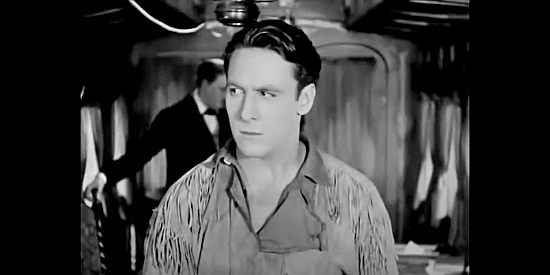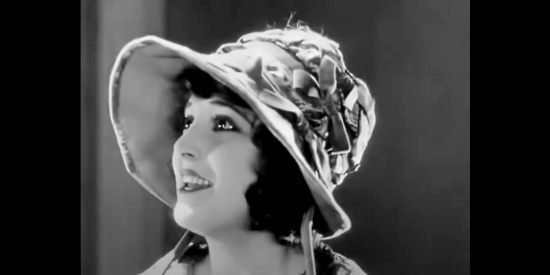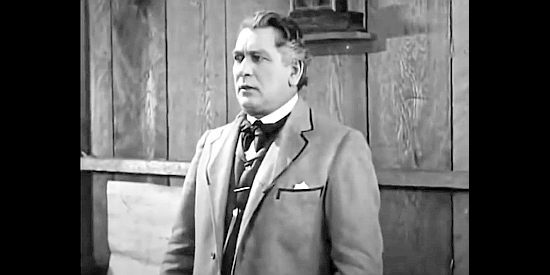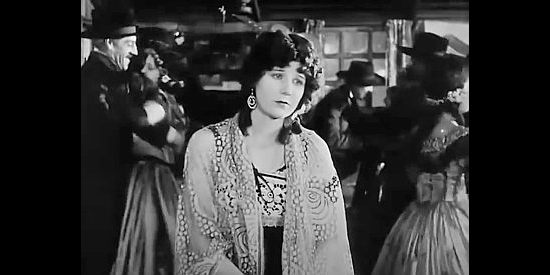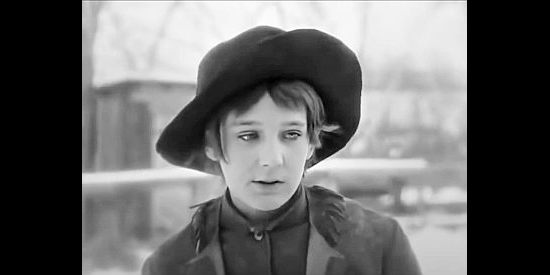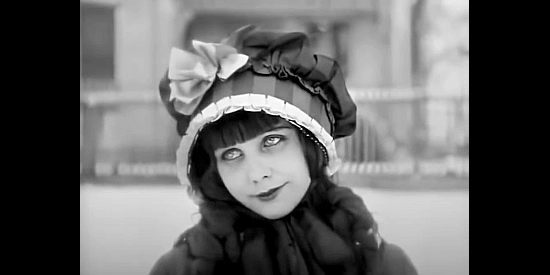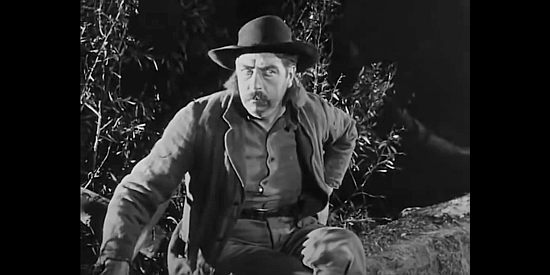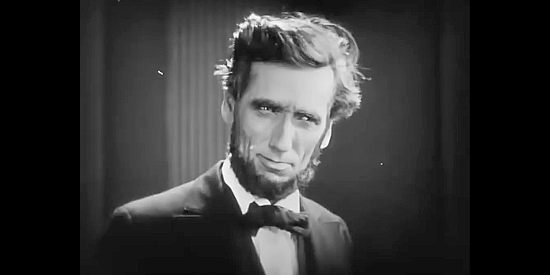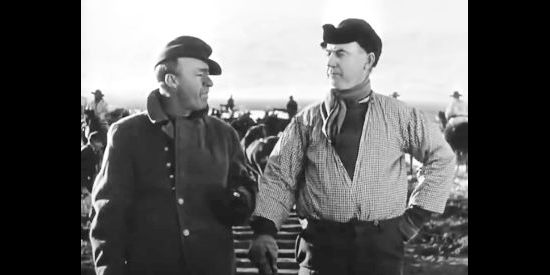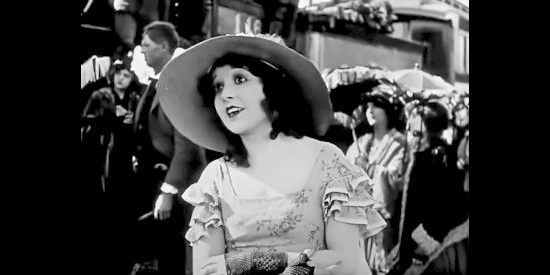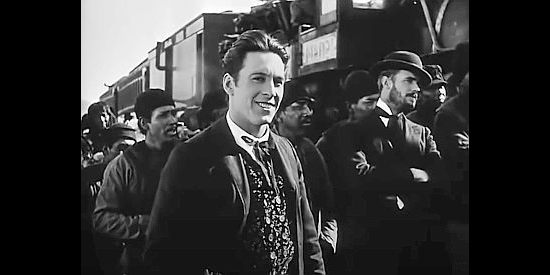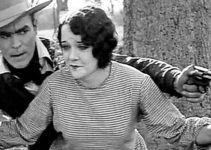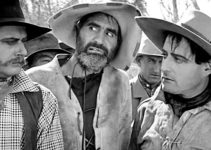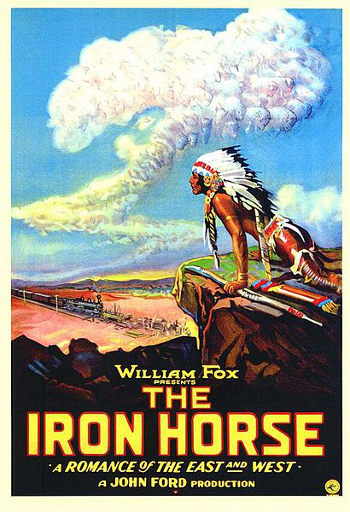 In pre-Civil War Springfield, Ill., a surveyor named Brandon dreams of a transcontinental railroad, and a businessman named Marsh expresses skepticism.
In pre-Civil War Springfield, Ill., a surveyor named Brandon dreams of a transcontinental railroad, and a businessman named Marsh expresses skepticism.
Nearby, Abraham Lincoln watches Brandon’s pre-teen son Dave and Marsh’s pre-teen daughter Miriam as their fondness for one another grows.
Flash forward several years to 1862, and President Abraham Lincoln signs a bill authorizing construction of a railroad spanning the West.
Thomas Marsh will be responsible for half of that project as the Union Pacific lines head westward.
His old friend Brandon won’t be involved. He headed west years earlier to survey a possible route for a railroad, only to be killed by Indians.
Dave (George O’Brien) was along on the trip and witnessed the attack on his father from hiding. Raised by fur trappers, he eventually became a rider for the Pony Express.
He’s doing just that one day when Indians attack. He escapes by jumping aboard a railroad car. Which leads to a reunion with Thomas Marsh and with Miriam (Madge Bellamy), who’s engaged to Jesson, her father’s chief engineer.
Facing a tight timetable and a tighter budget, Marsh is looking for a shorter route West. Turns out, before dying, Dave’s dad found a pass that would cut 200 miles off the planned route.
Dave promises to show Jesson that pass. But Jesson is in cahoots with a land speculator named Deroux, who would rather see Dave dead than the railroad change course.
John Ford’s first epic includes memorable scenes of Indians trying to lasso a train engine, the herculean task of dragging trains up mountains using horsepower and manpower, and the dismantling and rebuilding of rail-head towns as the tracks move West.
There’s also the intriguing and well-handled love triangle, with Miriam struggling to reconcile her commitment to Jesson with her feelings for Dave Brandon.
Unfortunately, there are also time-consuming diversions for comic relief featuring characters dubbed the Three Musketeers — Sgt. Slattery, Cpl. Casey and Private Shultz.
One diversion that works is a scene where saloon girl Ruby shoots a man in the hand for throwing beer in her face. A friend rushes to Ruby’s lover to report that she’s in trouble again for yet another shooting.
Not among the credited cast members are future star Jean Arthur, who plays a reporter, and Peggy Cartwright, who lights up the screen as young Miriam Marsh.
Cartwright appeared as a baby in 1915’s “Birth of a Nation” and was one of the original cast members in the “Our Gang” series of silent shorts.
Ford dedicated this film to Abraham Lincoln and, in the prologue, promises that it’s “accurate and faithful in every particular of fact and atmosphere is this pictorial history of the building of the first transcontinental railroad.”
Of course, later in the film, a title card claims the engines featured in the final scene were the very ones that met at Promontory Point in 1869, some 55 years earlier. They were not.
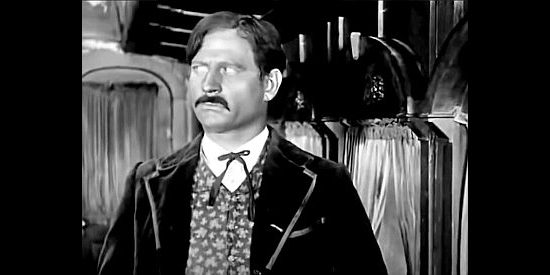
Fred Kohler as Deroux, a businessman determined to route the railroad his way in The Iron Horse (1924)
Directed by:
John Ford
Cast:
George O’Brien … Dave Brandon
Madge Bellamy … Miriam Marsh
Charles Edward Bull … Lincoln
Cyril Chadwick … Jesson
Will Walling … Thomas Marsh
Francis Powers … Sgt. Slattery
J. Farrell MacDonald … Cpl. Casey
James Welch … Private Schultz
George Wagner … Buffalo Bill
Fred Kohler … Deroux
James Marcus … Judge Haller
Gladys Hulette … Ruby
Runtime: 149 min.
Memorable lines:
Abraham Lincoln, defending the plan for a transcontinental railroad: “We must not let problems of war blind us to greater problems of the peace to come. Or we will have fought in vain.”
Cpl. Casey, when Miriam tries to convince with workers to keep at it: “They don’t understand ye, miss. Ye got to swear at ’em.”
Sign outside the saloon: “Jedge Haller, Souperier-Jedge by speshal apoyntment. My papers form the guvenr aint come as the stage was robbed, but i’m jedging jest the same. — Jed Haller.”
Judge Haller, at Ruby’s trial: “The charge is attempted murder. But the gent threw whiskey in the face of a lady what’s known to tote a gun — which ain’t attempted murder at all, but deliberate suicide. Case dismissed.”
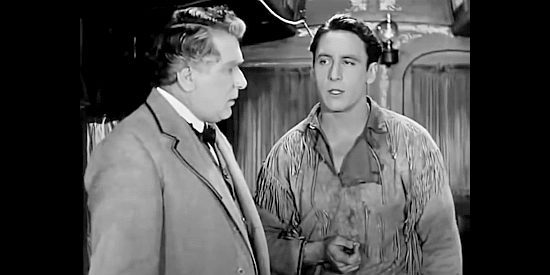
Will Walling as Thomas Marsh and George O’Rien as Dave Brandon discuss a pass his father found years earlier in The Iron Horse (1924)
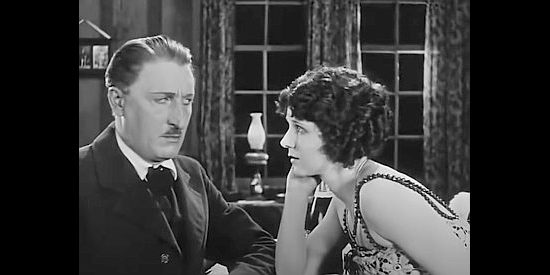
Cyril Chadwick as Jesson, trying to resist Ruby (Gladys Hulette) and her charm in The Iron Horse (1924)
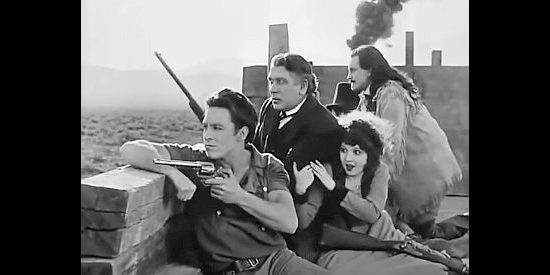
George O’Brien as Dave Brandon, Will Walling as Thomas Marsh and Madge Bellamy as Miriam in The Iron Horse (1924)
